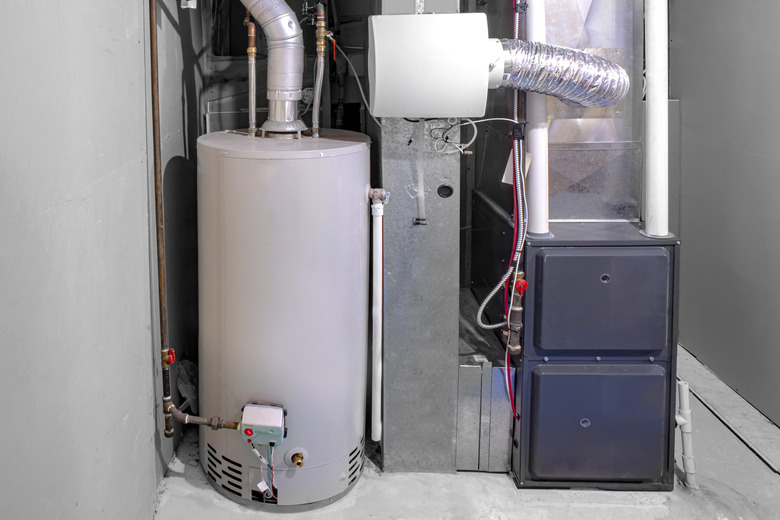Why Do I Smell Sulfur In My House?
We may receive a commission on purchases made from links.
No matter where it's coming from, the rotten-egg smell usually associated with sulfur is an unpleasant one, and it usually means something is wrong. The smell may actually be caused by a sulfur compound, such as hydrogen sulfide — which originates in fetid swamps and sewer pipes — or sulfur dioxide — a byproduct of fossil fuel combustion. Some odors emitted by microorganisms in your drains or appliances, though, may remind you of rotten eggs but aren't sulfur-related. Moreover, natural gas and propane are purposely modified to smell like rotten eggs. The nature of the odor and its remedy depend on the point of origination; to find that, start by following your nose.
Tip
A sulfur smell in your house can come from several different sources — gas leaks, water contamination, drain waste vents — and it usually signals that something is wrong.
Dangerous Gas Odors
Dangerous Gas Odors
A nonlocalized odor throughout the house usually means the point of origin is in the central heating and cooling system. If you have a gas furnace, the smell is a warning: Turn off the heating system immediately, vacate the premises and call the gas company! You may have a gas leak. Do not smoke or light any fires. If you smell rotten eggs near a gas stove or appliance, the leak may be coming from nearby pipes, and you may be able to pinpoint the leak yourself. Gas smells don't always signify major problems, but it's good to know when they do.
Central Air System
Central Air System
If you notice the odor during the summer when the air conditioner or swamp cooler is running, the source is probably contamination in the ducts or filters. The potential consequences aren't as dire as those from a gas heater, but your health may still be at risk. The remedy may be simply to clean the air conditioning unit as well as the ducts and drain lines, but sometimes the smell is coming from the condensate drain, and that's a different issue. In most cases, you can trace the cause and remedy the situation yourself.
In the Water
In the Water
The diagnostic strategies for sulfur smells in tap water differ according to whether you're on a well and whether the smell is in the hot water, the cold water or both.
Contaminated Water: The source of sulfur odors in water is usually hydrogen sulfide, a naturally occurring compound produced by bacterial breakdown of sewage and other organic waste. Its presence in the water usually indicates some kind of contamination that requires treatment. The cause could also be sulfates, which are salts of sulfur.
Smelly Well Water: If your house is on a well, it's important to test a sample directly from the well. If it has the characteristic rotten egg odor, it could mean that the well is contaminated, either by sewage from a leach field or by natural organic deposits. The usual ways to handle this problem are to disinfect the pressure tank or install a filtration system.
Water Heater Problems
Water Heater Problems
When you notice the smells only from the hot water faucets, it probably means the hot water tank is contaminated. You can flush and clean the tank yourself; sometimes, the remedy involves replacing the anode rod.
Drains and Toilets
Drains and Toilets
Sometimes, you can trace a rotten eggs smell to a plumbing drain, a toilet or both.
Odors From Drains: When you smell sulfur coming from one or more plumbing drains, they may originate from the drain pipes or all the way from the sewer. You might notice this smell in the basement; if so, it's usually coming from a floor drain. The smells can come from microorganisms in the pipes, but often they indicate venting problems that have drained a P-trap and allowed sewer gases to flow into the home.
Odors From Smelly Toilets: Despite their purpose, toilets aren't supposed to smell of sewer gases when you aren't using them. If yours does, it could indicate that the toilet has cracked or the wax ring seal has failed. It could also mean that blocked vents are forcing sewer gases through the toilet's trap or draining the trap.
In an Appliance
In an Appliance
Sewer smells can originate from inside a water-using appliance, such as a washing machine or dishwasher, or from the drain. Rectify the situation by servicing the drain or cleaning the appliance. If the appliance uses gas, you also need to check for gas leaks.
Sulfur Smells Outside
Sulfur Smells Outside
If you have a septic system, you may notice sulfur smells outside. They are probably coming from the tank or drainage field and indicate that your septic system needs servicing. If you don't have a septic system and notice sulfur smells outside, you probably have a plumbing blockage that needs to be cleared.
